
MARCUS TULLIUS CICERO
In Defence of the Republic
Translated with an Introduction and Notes by
SIOBHN McELDUFF
PENGUIN BOOKS
PENGUIN CLASSICS
Published by the Penguin Group
Penguin Books Ltd, 80 Strand, London WC2R 0RL , England
Penguin Group (USA) Inc., 375 Hudson Street, New York, New York 10014, USA
Penguin Group (Canada), 90 Eglinton Avenue East, Suite 700, Toronto, Ontario, Canada M4P 2Y3 (a division of Pearson Penguin Canada Inc.)
Penguin Ireland, 25 St Stephens Green, Dublin 2, Ireland (a division of Penguin Books Ltd)
Penguin Group (Australia), 250 Camberwell Road, Camberwell, Victoria 3124, Australia
(a division of Pearson Australia Group Pty Ltd)
Penguin Books India Pvt Ltd, 11 Community Centre, Panchsheel Park, New Delhi 110 017, India
Penguin Group (NZ), 67 Apollo Drive, Rosedale, Auckland 0632, New Zealand
(a division of Pearson New Zealand Ltd)
Penguin Books (South Africa) (Pty) Ltd, 24 Sturdee Avenue, Rosebank, Johannesburg 2196, South Africa
Penguin Books Ltd, Registered Offices: 80 Strand, London WC2R 0RL , England
www.penguin.com
First published in Penguin Classics 2011
Translation and editorial material Siobhn McElduff, 2011
All rights reserved
The moral right of the author and translator has been asserted
Except in the United States of America, this book is sold subject to the condition that it shall not, by way of trade or otherwise, be lent, re-sold, hired out, or otherwise circulated without the publishers prior consent in any form of binding or cover other than that in which it is published and without a similar condition including this condition being imposed on the subsequent purchaser
ISBN: 978-0-14-197093-6
PENGUIN  CLASSICS
CLASSICS
IN DEFENCE OF THE REPUBLIC
MARCUS TULLIUS CICERO (10643 BCE ), Roman orator and statesman, was born at Arpinum of a wealthy local family. He was taken to Rome for his education with the idea of a public career and, by the year 70, he had established himself as the leading barrister in Rome. In the meantime, his political career was well under way and he was elected . As a politician he compromised for the good of the Republic; as a statesman, his ideals were more honourable and unselfish than those of his contemporaries. Cicero was the greatest of the Roman orators, possessing a wide range of technique and an exceptional command of the Latin tongue. He followed the common practice of publishing his speeches, but he also produced a large number of works on the theory and practice of rhetoric, on religion, and on moral and political philosophy. He played a leading part in the development of the Latin hexameter. Perhaps the most interesting of all his works is the collection of 900 remarkably informative letters, published posthumously. These not only contain a first-hand account of social and political life in the upper classes at Rome, but also reflect the changing personal feelings of an emotional and sensitive man.
SIOBHN McELDUFF is assistant professor of Latin Language and Literature in the Department of Classical, Near Eastern and Religious Studies at the University of British Columbia. A native of Ireland, she is a graduate of Trinity College, Dublin, the University of Victoria (BC) and the University of Southern California. Her research is on the history and theory of translation in Rome and, in particular, the role of Cicero in that history; she has published several articles on this topic and is currently working on a monograph on the subject. She also works on the history of classical reception among the working class in the 18th and 19th centuries, with particular reference to Ireland.
Chronology
Cicero born (3 January).
9187 .
Cicero serves in the army of Pompey the Greats father.
Start of First Mithridatic War. Sullas first march on Rome. Marius flees Rome.
Death of Marius. Philosophical and Rhetorical Works: On Invention (date uncertain).
8381 Second Mithridatic War.
Sullas second march on Rome. of Marius supporters.
8179 Sullas dictatorship.
Ciceros first extant speech (In Defence of Quinctius).
Cicero delivers In Defence of Roscius of Ameria. Marries (c. 80).
7977 Cicero travels to the east and studies rhetoric in Athens and Rhodes.
Death of Sulla.
c . Cicero delivers In Defence of Roscius the Actor.
Ciceros quaestorship in Sicily.
7463 Third Mithridatic War.
7371 Verres governor of Sicily.
Delivers Against Verres. First consulship of Pompey and Crassus. Tribunes power of veto restored. loses exclusive control of juries.
Cicero . Delivers In Defence of Marcus Fonteius.
Lex Gabinia gives Pompey the command in the war against the pirates.
Ciceros praetorship. Delivers For the Manilian Law. Pompey given command in the Third Mithridatic War.
Birth of Ciceros son Marcus.
Ciceros consulship. Catilinarian conspiracy. Cicero delivers On the Agrarian Law II (January). Catilinarians delivered and Catilinarian conspirators executed (December). marries for the first time (c. 63).
Pompey returns to Italy and disbands his army. Clodius desecrates the rites of (December). Cicero delivers In Defence of Archias.
Clodius acquitted in the Bona Dea affair.
First (Caesar, Crassus and Pompey) formed.
First consulship of Caesar. Julia, Caesars daughter, marries Pompey. Clodius adopted by Fonteius and becomes a plebeian (March). Cicero unsuccessfully defends (his co-consul in 63) on an unknown charge.
Clodius . Cicero leaves Rome to go into exile (20 March). Caesar takes up his five-year command of the province of Gaul.
passes bill for Ciceros recall (4 August). Cicero returns from exile (4 September). Delivers On his house (29 September).
Cicero delivers In Defence of Sestius. Triumvirs renew their pact. Cicero successfully defends Marcus Caelius on a charge of public violence brought by Clodius.
Second consulship of Crassus and Pompey. Philosophical and rhetorical works: On the Orator.
Julia dies in childbirth.
Crassus killed by the Parthians at the battle of Carrhae. Cicero elected to the College of Augurs.
Milo kills Clodius (January). Pompey appointed sole . Cicero delivers In Defence of Milo (April).
5150 Cicero governor of Cilicia.
Philosophical and rhetorical works: On the Republic and On the Laws (date uncertain).
Caesar asks the Senate to be allowed to stand for the consulship in absentia but is refused. Cicero returns to Italy (November).
Cicero arrives in Rome (4 January). Caesar crosses the Rubicon; start of the civil war between Caesar and Pompey (10 January); Cicero joins Pompeys forces (June).
Pompey defeated at Pharsalus (August) and murdered in Egypt (September). Cicero returns to Italy and remains in Brundisium until September 47, when Caesar grants him an unconditional pardon.
Defeat of Republican forces in Africa. commits suicide (February). Cicero divorces Terentia and marries his ward, Publilia. Philosophical and rhetorical works: Brutus, Orator, Stoic Paradoxes.
Tullia dies (February). Cicero divorces Publilia. Philosophical and rhetorical works: Academica, On Ends, Tusculan Disputations, On the Nature of the Gods
Next page
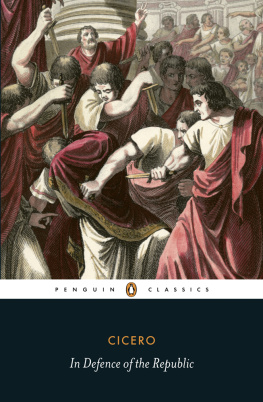

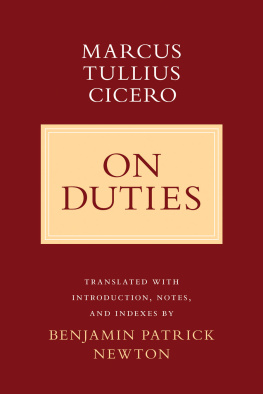
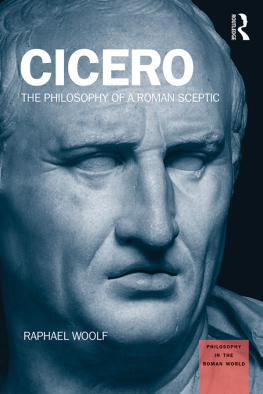
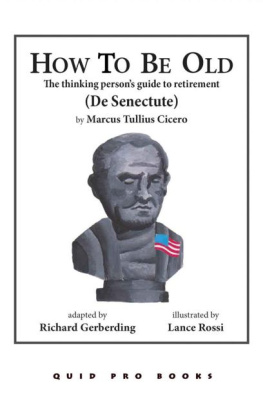


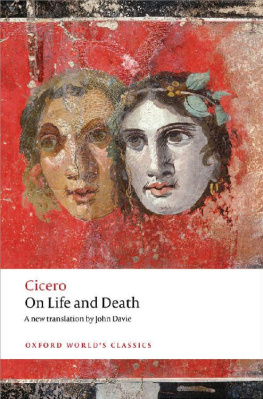


 CLASSICS
CLASSICS